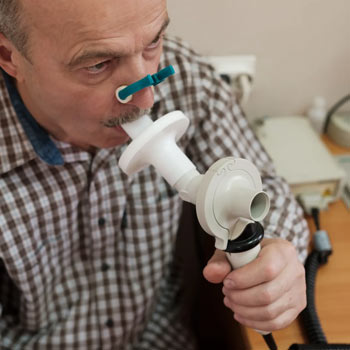Pulmonary function testing
- Home
- Services
- Pulmonology
- Pulmonary function testing
What is Pulmonary Function Testing?
Pulmonary Function Testing (PFT) is a diagnostic procedure used to assess how well your lungs are functioning. It provides valuable information about the capacity and efficiency of your respiratory system. Here’s a comprehensive guide to understanding PFT
Pulmonary Function Testing, commonly referred to as PFT, is a series of non-invasive tests designed to evaluate how well your lungs are working. These tests measure various aspects of lung function, including the volume of air you can inhale and exhale, how quickly you can move air in and out of your lungs, and how efficiently your lungs transfer oxygen into the bloodstream
Why is Pulmonary Function Testing Done?
PFT is performed for several reasons
- Diagnosis: It helps diagnose respiratory conditions such as asthma, chronic obstructive pulmonary disease (COPD), and pulmonary fibrosis
- Monitoring: PFT can track the progression of lung diseases and assess the effectiveness of treatment
- Pre-surgical Evaluation: Before certain surgeries, especially those involving the chest or lungs, PFT can assess whether a patient can tolerate anesthesia and surgery
- Assessment of Lung Function: For individuals exposed to occupational hazards like chemicals or asbestos, PFT can assess lung function changes over time

How many types of Pulmonary Function Tests exist?
There are several types of tests conducted during PFT, each focusing on different aspects of lung function
Spirometry
This test measures the amount of air you can inhale and exhale, as well as how quickly you can move air in and out of your lungs. It helps diagnose conditions like asthma and COPD.
Lung Volume Measurements
These tests determine the total amount of air your lungs can hold, which is useful in diagnosing restrictive lung diseases
Diffusion Capacity Test
This measures how well oxygen moves from your lungs into your bloodstream, which helps diagnose conditions affecting the lung tissue or blood vessels
Maximal Voluntary Ventilation (MVV)
This test measures how much air you can breathe in and out during a 12 to 15-second interval. It provides an overall assessment of respiratory muscle strength and endurance.
Preparation and Procedure
Before undergoing Pulmonary Function Tests, it’s essential to follow specific instructions provided by your healthcare provider. This may include avoiding certain medications that could interfere with test results, such as bronchodilators or inhalers
During the test, you will be asked to breathe into a mouthpiece connected to a machine that records your lung function. You’ll perform various breathing maneuvers, such as deep inhalations and forceful exhalations, according to the technician’s instructions
Interpreting Results
Once the tests are completed, a pulmonologist or respiratory therapist will analyze the results. They will compare your test values to predicted norms based on factors like age, height, and gender. Abnormal results may indicate a variety of lung conditions or diseases, which may require further evaluation or treatment
Pulmonary Function Testing is a crucial tool in diagnosing and managing respiratory conditions. By assessing lung function through a series of tests, healthcare providers can tailor treatment plans to improve respiratory health and overall quality of life. If you have concerns about your lung function or respiratory symptoms, consult with a healthcare professional to determine if PFT is appropriate for you.
